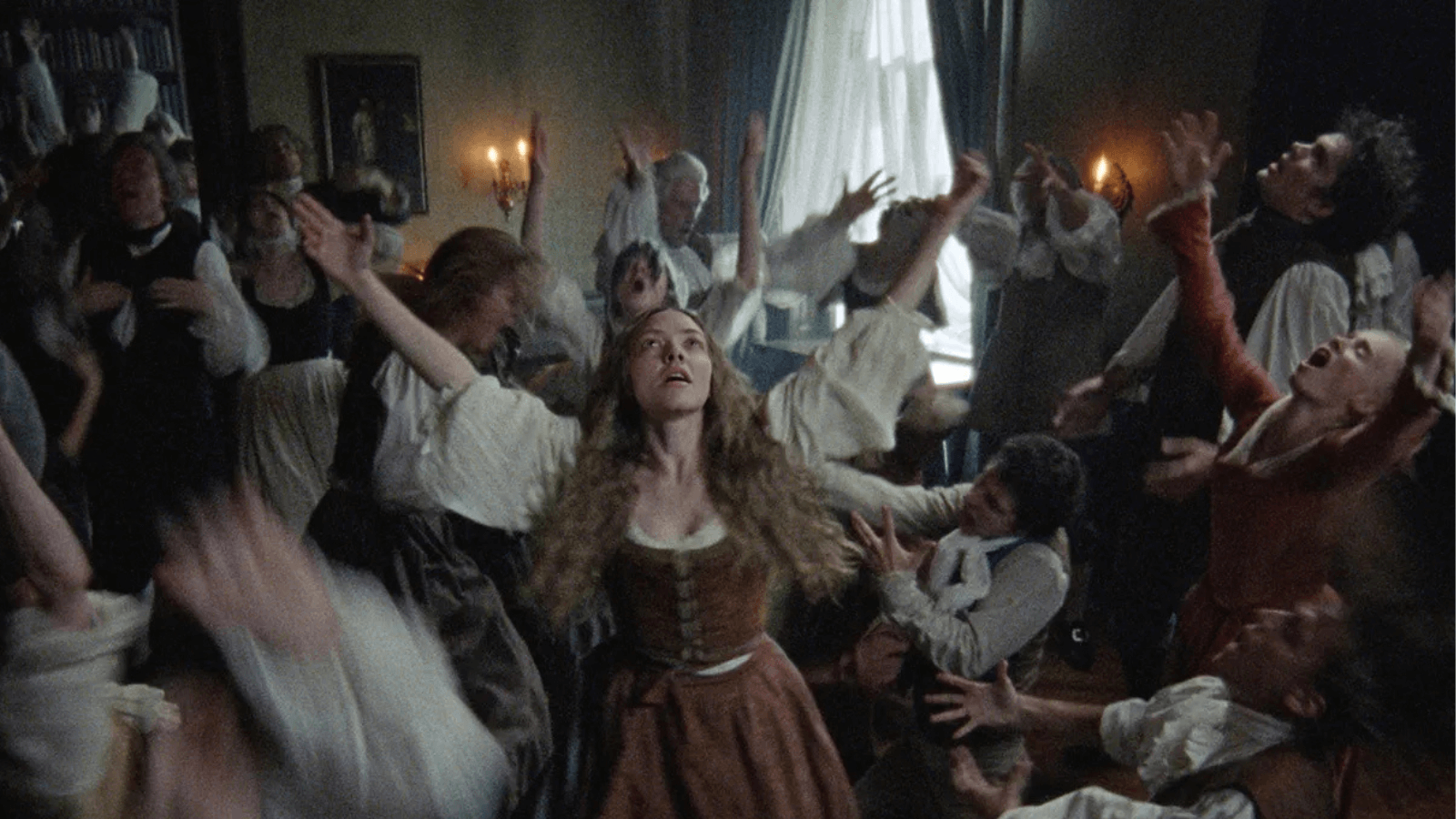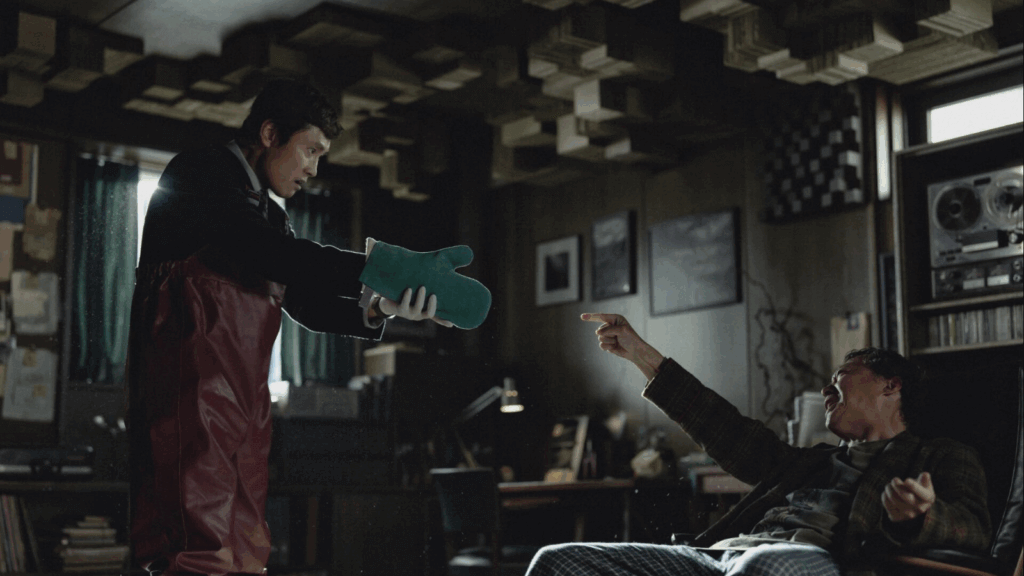
Zurich Film Festival Dispatch – Part 4
By David Hill | October 14, 2025
The 21st Zurich Film Festival ran from September 25 to October 5. Check here for the full lineup. Some films mentioned below will be reviewed separately in full-length writeups, but for now, here are some initial impressions. Also, check out Part 1, Part 2, and Part 3.
The Testament of Ann Lee
Sounds
The Testament of Ann Lee is the new film by Mona Fastvold. Like last year’s The Brutalist, it was co-written by Fastvold and her partner Brady Corbet. Stylistically and thematically, the two films share similarities: by telling the story of an immigrant with austere visuals and meticulous period detail, both explore foundational aspects of the United States—The Brutalist examines capitalism, whereas The Testament of Ann Lee dives into religion.
Fastvold’s film centers on the real-life figure of its title, played by Amanda Seyfried. Born in England in 1736, Ann Lee became the spiritual leader of the Shakers—a millenarian restorationist Christian sect marked by ecstatic worship and the belief that Lee was the female embodiment of Christ. Together with a small group of followers, she emigrated to the USA in 1774, where the Shakers went on to gather a significant following. The movement’s singing and dancing during worship allows Fastvold to stage The Testament of Ann Lee not only as a historical drama, but also as a musical—one where, unlike conventional musicals, the musical numbers are grounded in reality. Thanks to excellent staging and committed performances, some of these numbers are dazzling and among the film’s high points.
Beyond its musical numbers and an excellent, idiosyncratic score by Daniel Blumberg, The Testament of Ann Lee is a rather straightforward historical drama. Despite a harrowing depiction of the traumatic events that push Lee toward religious extremity, the film remains emotionally distant and offers only limited access to her inner world. Simultaneously, it does not maintain enough distance from the Shakers to offset this through critical observation. As a result, The Testament of Ann Lee is a mostly objective retelling of Lee’s life that lacks depth and a strong point of view—despite touching upon several interesting themes.
Fastvold partially makes up for this lack of depth by presenting a flawless surface. Aside from a few unconvincing CGI backgrounds, the craftsmanship on display in The Testament of Ann Lee is impressive. Like The Brutalist, it makes the most of a comparatively small budget. High production values—including striking cinematography, as well as outstanding production and costume design—successfully immerse the viewer in the 18th-century setting. Moreover, Seyfried shines in the central role, with the rest of the cast (including Thomasin McKenzie, Christopher Abbott, and Tim Blake Nelson) also delivering solid performances.
Thanks to its strengths and the interesting real-life figure at its center, The Testament of Ann Lee is well worth seeing despite its shortcomings. That said, viewers hoping for a film on the level of The Brutalist may be disappointed. 3/4 stars

No Other Choice
Gala Premieres
Reminiscent of Bong Joon-ho’s Parasite without feeling derivative, Park Chan-wook’s latest film is a satirical black comedy thriller. It is based on Donald E. Westlake’s 1997 novel The Ax—already adapted to film in 2005 by Costa-Gavras, to whom No Other Choice is dedicated.
Park’s film is set in South Korea and follows a paper industry expert named Man-soo (Lee Byung-hun—excellent). He happily lives with his wife and two children in relative wealth, but his existence is soon shattered. After his longtime employer is acquired by an American conglomerate, he loses his job during a mass layoff. As his family must tighten its belt, Man-soo—who has defined himself through his job and his position as the family’s breadwinner—becomes increasingly desperate. To land one of the few expert positions left in the South Korean paper industry, he devises a scheme to locate and eliminate his competitors.
Thanks to sharp commentary, excellent black humor, and Park’s dazzling direction, No Other Choice is a compelling film. It leans into absurdity and at times even verges on slapstick, but this does not take away from the seriousness of the underlying emotions and themes. Man-soo’s despair is deeply felt, and the film’s timely exploration of the dehumanizing effects of capitalism and automation packs a punch—even if it is not particularly subtle or deep.
As viewers have come to expect from Park, the filmmaking craft on display in No Other Choice is outstanding. In addition to his command of tonal shifts, his creative framing and editing choices inject energy and a sense of urgency. Similar to Park’s last film Decision to Leave, some shots have an unpleasant digital sheen, but that is easy to overlook given the film’s otherwise flawless visual presentation.
For the first hour of No Other Choice, I was completely engrossed and ready to call it one of the best films of the year. While it remains engaging and has a strong ending, it does not quite sustain this level. As a result, some of the later sequences feel repetitive, and the film does not fully earn its 139-minute runtime. Even so, No Other Choice is a strong addition to Park’s remarkable filmography—a highly entertaining, thoughtful, and technically impressive work that will not leave anyone cold. 3.5/4 stars

Left-Handed Girl
Feature Film Competition
Left-Handed Girl is the solo feature debut from Taiwanese-American filmmaker Shih-Ching Tsou, best known for her collaborations with Sean Baker. Among other things, she co-directed Take Out with Baker and co-produced several of his later films, including The Florida Project and Red Rocket. The two filmmakers once again collaborated on Left-Handed Girl, with the Oscar-winning director of Anora acting as co-producer, co-writer, and editor.
Unsurprisingly, Left-Handed Girl feels in line with Baker’s sensibilities. The film takes a slice-of-life approach, delivering a naturalistic and empathetic portrayal of a working-class single mother and her two daughters. Simultaneously, Tsou brings her own personal touch, which distinguishes the film from Baker’s previous work—particularly through its Taipei setting and cultural specificity. The film’s strongest element is the way it immerses the audience in its setting: everything feels authentic and lived-in, and the night markets, scooters, and neon lights of Taipei are beautifully captured.
The story does not fully live up to this strong sense of place, as it sometimes meanders and feels familiar. Nevertheless, Left-Handed Girl remains engaging thanks to richly drawn and convincingly portrayed characters. Moreover, an unexpected and satisfying late reveal adds another layer to the film, ensuring that it ends on a high note. Overall, Left-Handed Girl is an accomplished solo feature debut that signals Tsou as a filmmaker to watch. 3/4 stars

I Love You, I Leave You
Documentary Competition
I Love You, I Leave You was not on many people’s radar at the beginning of this year’s ZFF, but it turned out to be one of the biggest surprises of the festival. After being warmly received at its world premiere, it went on to become the first Swiss film to win the Documentary Competition at Zurich.
The film is a deeply personal account of director Moris Freiburghaus and his close, mentally ill friend Dino Brandão—a Swiss singer and musician of Angolan descent. Through the eyes of Freiburghaus, we witness Brandão suffering a manic episode after a trip to Angola. What begins with intense mood swings and a refusal to sleep quickly turns darker, with Brandão being arrested by the police and involuntarily hospitalized. All the while, Freiburghaus tries to support his friend as best he can, struggling to reach him emotionally and having to make tough decisions on his behalf—such as whether to reveal Brandão’s location to the authorities after he escapes from the clinic.
Shot on the fly, the gritty visuals of I Love You, I Leave You offer little to savor, but they fit the film’s candid and unflinching depiction of mental illness. In what may frustrate some viewers, Freiburghaus remains vague about the exact nature of Brandão’s illness and their friendship prior to the events depicted. However, what we witness is enough to gather that this is not Brandão’s first manic episode and that he and Freiburghaus share a strong and beautiful—if at times understandably strained—bond.
Whatever shortcomings the visual presentation and context-setting may have are offset by the raw emotional power of what Freiburghaus has captured. I Love You, I Leave You offers intimate access to something that remains unjustly stigmatized by society. In doing so, the film shows both the importance and the limits of understanding people suffering from mental illness, as well as the toll the illness takes on everyone involved—including Brandão’s supportive father, who also receives considerable screen time. Moreover, the film subtly addresses themes of identity, racism, and institutional failure.
Given the level of intimacy and vulnerability on display, I Love You, I Leave You can make for uncomfortable viewing, but it never feels exploitative. The film preserves the dignity of its subjects and offers hope through its depiction of the healing power of friendship and art. Together with his friend Brandão, who received a co-writing credit and scored the film, Freiburghaus has created an eye-opening documentary that packs a considerable punch. 3/4 stars

Mirrors No. 3
Gala Premieres
With a runtime of just 86 minutes, a limited setting, and a small cast, Christian Petzold’s Mirrors No. 3 might seem minor at first glance. It follows a quiet, emotionally fragile piano student named Laura (Petzold regular Paula Beer). She survives a car accident and is taken in by Betty (Barbara Auer), a local woman who witnessed the crash. What initially seems like an act of kindness gradually turns into something deeper and more enigmatic.
Light on plot but heavy with meaning, the deceptively simple film rewards attentive viewers with layers of subtext. Without spelling everything out, Petzold explores themes including trauma, grief, identity, and human connection. Moreover, several elements of the film—such as a mysterious stand-up paddler (one of the film’s most striking images) and Betty’s house with various broken appliances—lend themselves to a metaphorical reading.
In some of Petzold’s previous work, such as Undine, the rich subtext came at the expense of the literal narrative. That is not the case with Mirrors No. 3: like the writer-director’s finest films (Transit, Barbara), it finds a harmonious balance and succeeds on both a subtextual and literal level. This is partly due to the film’s complex, compelling characters who are brought to life by outstanding performances. Additionally, Petzold’s signature restrained but lyrical visual style, as well as his striking use of diegetic music—the film takes its title from a beautiful Maurice Ravel piece featured on the soundtrack—create a haunting, melancholy atmosphere.
For all these reasons, Mirrors No. 3 is both a sensual, absorbing film in the moment and a work that lingers long after the credits roll. 3.5/4 stars

How Deep Is Your Love
Documentary Competition
In her feature debut How Deep Is Your Love, documentary filmmaker Eleanor Mortimer accompanies scientists on a research trip to the Clarion-Clipperton Fracture Zone in the Pacific Ocean. The film offers dazzling imagery of fascinating, previously unknown deep-sea creatures. Without becoming didactic, it also carries a strong environmental message and subtly raises thought-provoking questions about research ethics and financing. As the audience learns, the research trip is financed by large corporations intent on mining the seabed for metal-rich nodules, which poses a threat to the ecosystem on display. Given the film’s strengths, its few shortcomings—from uneven pacing to Mortimer’s deliberately detached narration, which takes some getting used to—are easy to overlook. 3/4 stars

David Hill is a lawyer from Switzerland. He has long had a passion for cinema, and he devotes most of his spare time to watching and researching films. His primary interest focuses on arthouse films, and he occasionally contributes to Deep Focus Review as a guest writer.
Thank You for Supporting Independent Film Criticism
If the work on DFR has added something meaningful to your love of movies, please consider supporting it.
Here are a few ways to show your support: make a one-time donation, join DFR’s Patreon for access to exclusive writing, or show your support in other ways.
Your contribution helps keep this site running independently. However you choose to support the site, please know that it’s appreciated.
Thank you for reading, and for making this work possible.
Brian Eggert | Critic, Founder
Deep Focus Review




